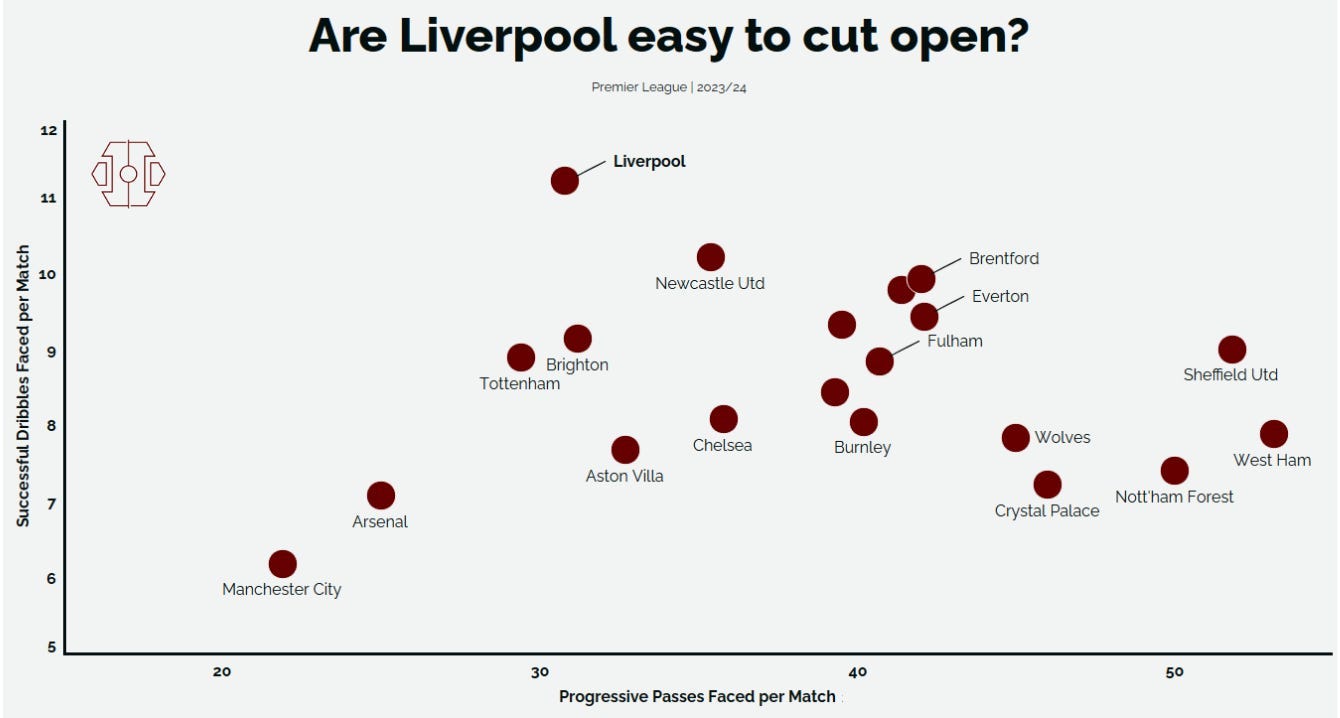Patience, Palm Trees and Curtis Jones
Liverpool might finally learn how to relax under Arne Slot.
Do you have a pet hate when you’re watching Liverpool at Anfield? Is it the queuing? What about that person sat next to you who seems to need the toilet every five minutes? Alright, what about the traffic after the final whistle?
Well, I know what mine is. Whenever I’m sat in the stadium, it usually takes about 12 minutes before somebody close to me screams ‘quicker’ at the top of their lungs.
In England, we’ve got a thirst for vertical football. Move the ball from A to B as fast as you can. If you pass the ball sideways, you’re boring. And if you pass the ball backwards, well — for your sake — let’s just hope you’re too far away from the stands to hear what supporters are saying about you.
That partially explains why Jürgen Klopp is adored on Merseyside. And why Gary Neville has always wanted him to manage Manchester United. And why every die-hard England fan now wants him to replace Gareth Southgate.
Klopp’s football was practical, direct and lively. Why play through midfield when you can completely bypass it? His football always felt streetwise, but without being passive or especially pragmatic. Organised chaos, he once called it.
Well, over the past 18 months, Liverpool’s yearning for anarchy has got a bit out of hand, and it has coincided with some churn in the squad, with seasoned figures such as Roberto Firmino, Jordan Henderson, Sadio Mané and Gini Wijnaldum calling time on their Premier League careers.
They have been replaced by players with really offensive minds. Alexis Mac Allister, Dominik Szoboszlai, Darwin Núñez, the list goes on. Aside from Wataru Endō, pretty much everybody wants the spotlight.
You won’t be surprised to find out that Liverpool averaged the most shots in Europe last season. Klopp’s men placed in a league of their own with 20.6 per match, followed by Bayern Munich in second on 18.6. Two whole shots separated first and second, which is just crazy.
The Reds painted themselves as a capable but slightly unhinged attacking unit. It was loads of offensive players representing Klopp’s helter-skelter playing style, and the product wasn’t a surprise.
Liverpool ended up being great to watch, but they ultimately fell short due to a lack of control. In simple terms, the Reds had no chill. Their no-filter approach to creating chances delivered some perks, but it ultimately hurt the team at the opposite end.
If your use of the ball is hectic, you’re going to find defending pretty hard and laborious. Every player for Liverpool had a license to try anything at any given moment last term, which isn’t bad per se, but what happens when you lose the ball?
Trent Alexander-Arnold in particular likes to accelerate the game whenever he spots an opening. He’s Hollywood, and you want to get the most from him, but Liverpool rarely seemed equipped to sweep up after him whenever his killer balls failed to bear fruit.
I talked about this on The Anfield Wrap last August. I recorded this with Neil Atkinson after our very first game of the season against Chelsea.
Three weeks later, I was still talking about our use of the ball. Again with The Anfield Wrap after Liverpool’s 3-0 win over Aston Villa. In that bout, the Reds actually got the balance right.
Overall, though, for most of the campaign, Liverpool sided with the devil on their shoulder a bit too much. If you lose the ball when none of your teammates are expecting it, you probably won’t defend the resulting attack very well.
Think about it. If you know that a fire is about to start, you can be ready to extinguish it, whereas if that same fire is unexpected, it’ll probably spread before you can manage the danger.
As shown below, Liverpool were about Champions League good when it comes to conceding progressive passes, and the worst in the division for getting dribbled past. Manchester City and Arsenal, by contrast, showed up as title-winning good in both metrics.
Once Arne Slot was identified as Klopp’s successor, I felt his priority on the training ground was obvious this summer. Make Liverpool harder to cut open, and achieve that by using the ball with a brain.
Less chaos, more control. Fewer shots, but fewer shots faced. More patience when building through the thirds and making decisions. Accelerate play when the time is right. Once your safety net is prepared, then you can try your killer pass.
Think about the potential impact on pressing. If you’ve had possession for the last 30 seconds, your tank should be full, so if you lose the ball, you’re more than ready to run and chase.
If you lose possession in the middle of an end-to-end basketball game every five seconds, on the other hand, you might just be shattered. And you might just get injured a bit more often because of the demands on your shoulders.
Liverpool need more chill. Palm trees, sand, sunglasses. You still play fast, but when the time is right. You still attempt to create, but when everybody behind the ball knows about the fire that could be about to emerge.
Well, the good news is Liverpool might be about to adopt that healthy new habit. The Reds, after years of chasing the next high, actually seem to be in the process of learning how to relax.
Speaking ahead of Liverpool’s first pre-season contest this weekend, Curtis Jones offered an insight into what Slot has been installing on the training ground over the summer, courtesy of This Is Anfield:
Beautiful. To be honest, I would’ve preferred Jones to sing his answer. We’ll see the real evidence on the pitch, of course, but the prospect of Slot teaching his players how to put their feet up when they have possession is very encouraging.
This doesn’t mean dire football, no. It doesn’t mean a borefest for supporters in the stands, either. Instead, this is merely about Liverpool getting to grips with control after spending so long under a maniac in football terms, albeit one who we truly loved.
When you’ve got the ball, sit back and unwind. Buy an ice cream. Order a cocktail. Save the chaos for when you’re trying to win it back.







There's a stat - there's always a stat! - which frames the issue quite neatly, and it's ground duels, which accounts for dribbles, fouls and tackles.
Liverpool contested 2,746 last season, around 84th percentile for volume by Premier League standards. High, but not super high.
However, they only won 41.7% of them. If you look for a team that contested at least as many while winning such low a proportion, you find Bielsa's Leeds twice and Andoni's Bournemouth.
Liverpool's three lowest ground duel totals since 2011/12 were 2021/22 (2,263), 2018/19 (2,299) and 2019/20 (2,309), the three seasons in which they broke 90 points. More ground duels = more chaos, more transitions. No single stat explains everything, of course, but I think there's a very good chance Liverpool contest fewer ground duels than in many Klopp seasons in 2024/25 as they should have more control of proceedings.
Under Klopp, the pressing at times seemed spontaneous and unplanned leaving players uncertain or disconnected. In the few clips we’ve seen with Slot, he’s said things during training like “come close” and demonstrated bits of one touch football, something pretty foreign during Klopp. Those principles naturally put the players closer together and in “hot zones” as I’ve heard some analysts describe it as.
Instead of a single player igniting a press after possession loss and a player 20 yards away following, you’ll have 3-5 players within 20 yards of each other ready to pounce as a collective when they lose the ball. Even better, if possession isn’t won they’ll fall back into a 4-4-2 sort of mid block!? I can’t wait to see it in action.
World class presentation, Josh. Sleek visual header, and the quality and accessibility of the embedded videos is crazy! No ad prior to viewing or buffering. The details don’t go unnoticed, thank you.